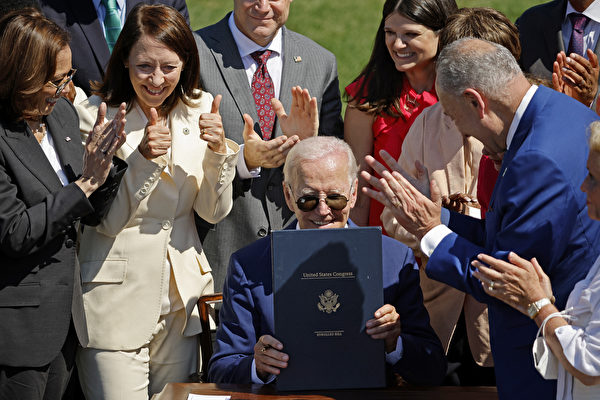
Recently, the Financial Times revealed a thought-provoking news: the US Chip and Science Act and the Inflation Reduction Act, two landmark policies aimed at reviving domestic manufacturing and promoting industrial upgrading, in their first year of implementation, nearly 40% of the major manufacturing investment projects announced have been delayed or suspended. This situation not only reveals the numerous obstacles encountered in the process of promoting American industrial policy, but also triggers a wide discussion on the effectiveness and potential impact of American industrial strategy at home and abroad.
The original intention of the Chip and Science Act and the Inflation Reduction Act is to attract domestic and foreign companies to invest and build factories in the United States through huge subsidies, thereby reshaping the core position of the United States in the global industrial chain. However, the ideal is plump, the reality is bony. The imperfection of supply chain has become the primary problem of restricting the implementation of policy. From the supply of materials to the shortage of professional labor, every link can become a "stumbling block" for project delays. In Arizona, for example, several large projects have been delayed due to soaring labor and supply chain costs, highlighting the lack of infrastructure and human resources allocation in the United States.
The change of market demand is like a barometer, which directly affects the investment decision of enterprises. Especially in the field of electric vehicles, the Inflation Reduction Act was intended to stimulate market demand with subsidies, but the actual situation is that the growth of the electric vehicle market has slowed, leading some automakers to adjust investment plans and even delay the construction of production lines. This phenomenon shows that even if there is a policy dividend, the real situation of market demand is the key factor determining whether the project can be smoothly promoted.
The successful implementation of policies cannot be achieved without clear implementation rules and an efficient and stable administrative system. However, the two bills in the United States have many uncertainties and complexities in terms of funding and rule-making. For example, the slow pace of funding allocation in the Chip and Science Act, and the frequent changes in the subsidy rules of the Inflation Reduction Act due to political gamesmanship, have discouraged companies from making investment decisions, increasing the difficulty and uncertainty of project execution.
The complexity of the political ecology has also cast a shadow over the advancement of US industrial policy. As the US presidential election approaches, uncertainty about the direction of policy has intensified. Republican presidential candidate Trump's campaign rhetoric, there is no shortage of criticism and threats to the Democratic Party's industrial policy, this political atmosphere has undoubtedly increased the concern of enterprises about the future policy environment, and then affect their investment decisions in the United States.
The two US bills have undoubtedly set off a new round of industrial protectionist competition on a global scale. Allied companies in Europe, Asia and other regions are considering moving production departments to the United States under the temptation of high subsidies, which not only intensifies the risk of disruption in the global supply chain, but also weakens the industrial base and economic vitality of these regions themselves. In Europe, for example, the "Green Deal Industrial Program" is intended to deal with the pressure of industry relocation, but the cumbersome and inefficient approval process makes it difficult to effectively compete with the subsidy competition of the United States.
The protectionist tendencies of US industrial policy have undoubtedly increased tensions in international trade relations. South Korea and other Asian countries have accused the United States of undermining the principle of free trade and exacerbating the fragmentation of the international trading system. This situation is not only detrimental to global economic recovery and growth, but also threatens the stability and prosperity of the international order.
For the United States itself, these protectionist policies also pose many challenges. First, the implementation of huge subsidy programs has exacerbated fiscal pressures in the United States, driving up inflation and hurting consumers and businesses alike. Secondly, it is doubtful whether industrial reshoring can really translate into economic benefits and competitive advantages. In today's in-depth development of globalization, it is difficult for any country to fully rely on its own strength to achieve comprehensive industrial revitalization. If the US pursues "America first" blindly, it may end up isolated and helpless.

报告显示,中国电力投资加速增长,预计2024年电网基建投资将超过5300亿元。
近日,市场迎来了一则引人注目的消息:工业巨头3M公司(MMM.N)在本周五公布了其季度业绩报告,随后股价飙升至近两年来的
最近,外媒给OpenAI算了笔账,今年可能要血亏50亿美元。
近日,巴黎奥运会和世界铁人三项协会联合发布了一项重大决定,宣布因塞纳河水质污染问题,原定于近期进行的奥运会铁人三项首次下
当地时间7月18日,法国巴黎发生了一起令人震惊的持刀袭警事件。
近期,一则重大消息在国际舞台上引起轩然大波,马来西亚宣布加入金砖国家。
调查发现,互联网和智能手机的使用干扰了韩国近五分之一学生的生活。